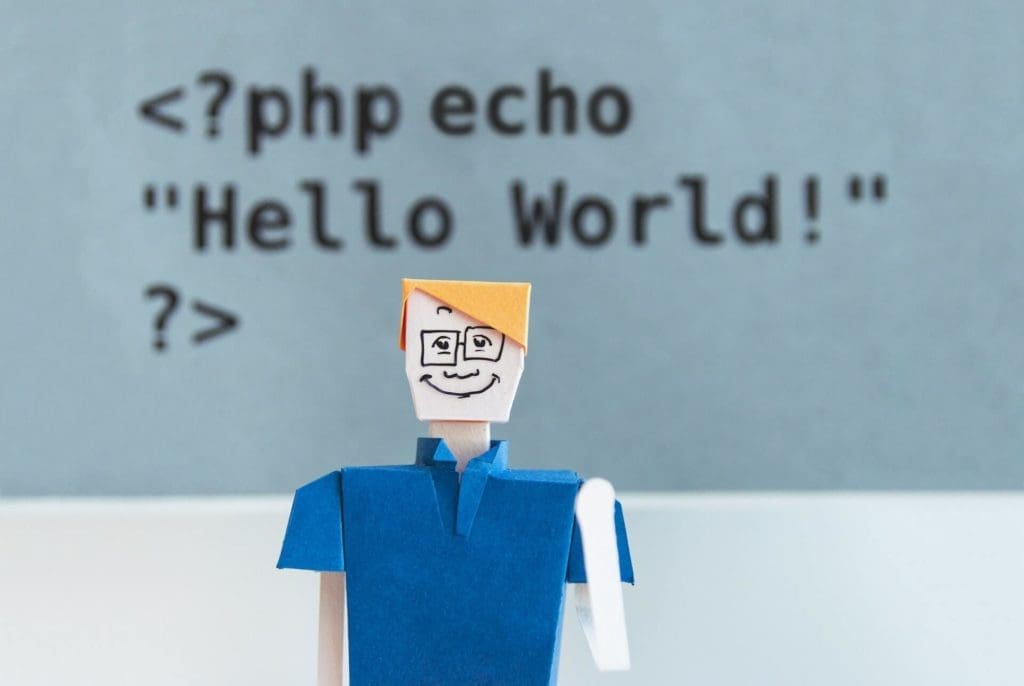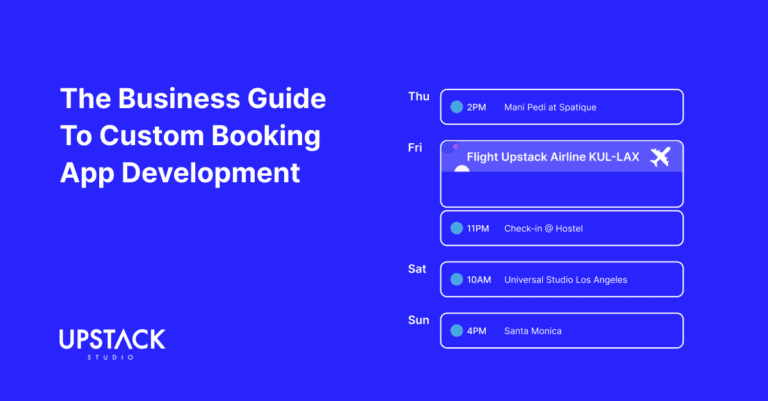A good founder is an angry father.
Think of your app as your daughter.
Smart, beautiful, and worth a million bucks. ( guess she got most of her genes from her mom).
Now think of every developer as a potential boyfriend.
We see her and we swarm like flies to a pot of honey. We’ll all say we can take care of her, so please just leave her in our hands.
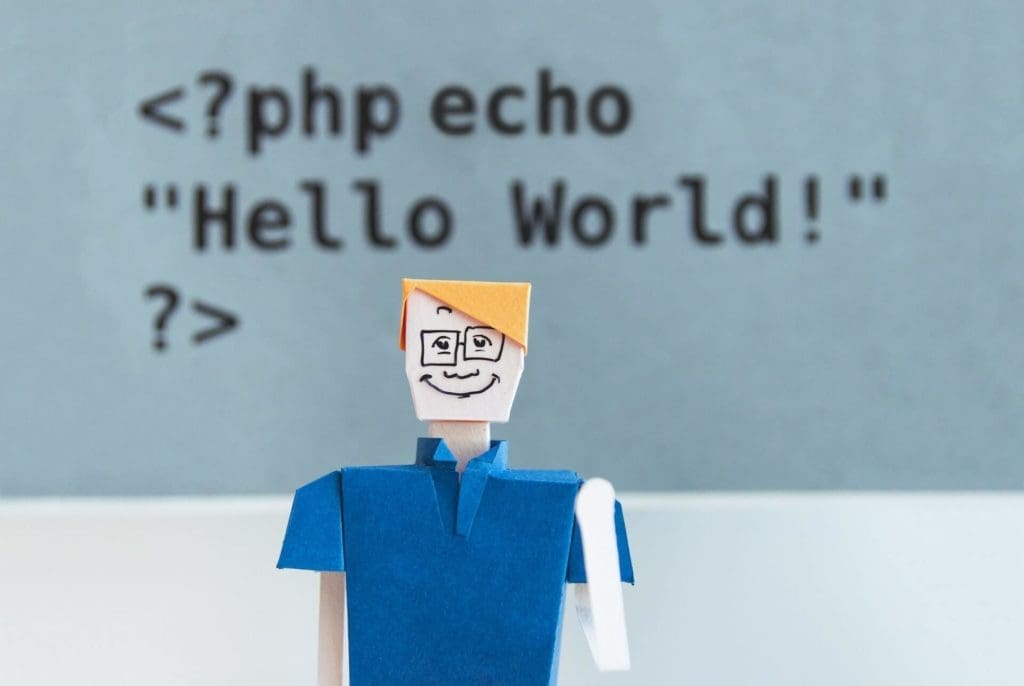
Not good enough!
As a founder, you need to make developers put our money where our mouth is. Make us prove that we’re worthy of walking your app down the altar.
The Importance of Asking App Developers the Right Questions
There are a million app developers out there, and some are better at talking than developing. Keep your baby safe by asking app developers the right questions and sniffing out red flags.
You’ll find online lists of questions for app developers that go into 30+ items.
We think that’s a bit overkill.
Let’s keep it short and sweet.
Below, we share six crucial questions for app development companies that reveal whether a developer is husband material or just looking for a good time.
Questions For App Development Companies
What’s your app development methodology and process?
Say you got in touch with Upstack Studio today.
You have an idea, but you’re not sure about execution.
We’d easily recommend Agile methodology: build the first most crucial 10% then work with you towards 100% based on user feedback.
Say you came back the next day with a second project.
It’s 90% done and you’re sure of what you need for the other 10%.
We’d still go with Agile!
To us, there is no 100% sure in software development – always leave room for surprises and improvement.
But that’s just us.
Every developer will have a preferred methodology. We explained our reasons, let your developer explain theirs.
Meanwhile, the development process will look something like this:
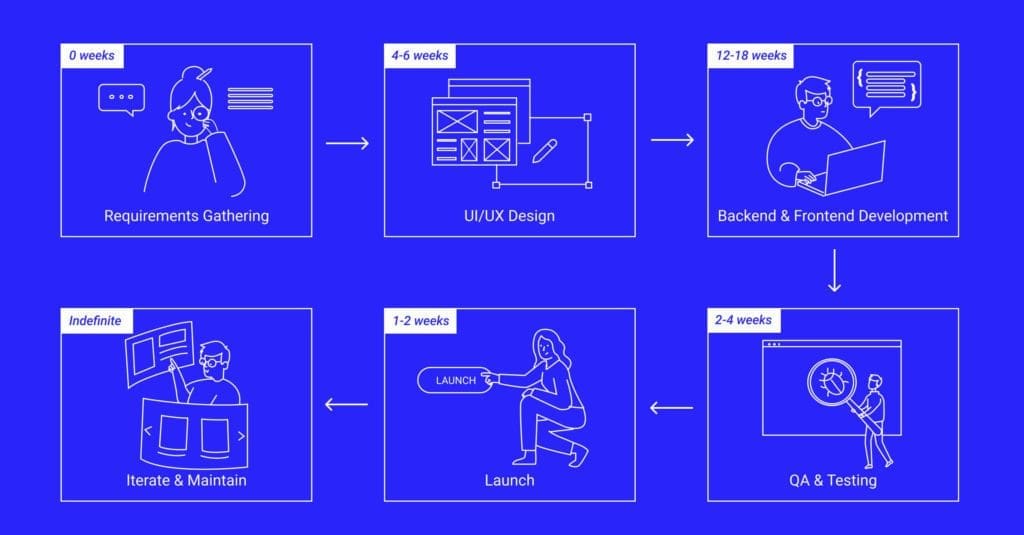
As you can see, it refers to the stages your app developer goes through to design, build, test, and maintain your app, and an estimate of how long each step will take.
It’s a foundational question to ask app development companies, and any competent team will have a plan like this.
Have you worked on similar projects?
Ideally, the developer then says yes and hands you a portfolio with 400 identical apps.
At that point, your developer can just sneeze and your app will fall out of their nose perfectly finished.

An app developer with relevant experience can give estimates that are much less inaccurate.
Yes, we meant to say it that way.
Estimates will always be off, but an experienced app developer can get it within a decent margin of error.
Where it’s really valuable is you can check out their work to see if it matches your vision.
You now have a reliable baseline.
Even an unsuccessful experience is better than none. If your developer can explain why a previous project went wrong and what they learned from it, that’s a team that will go the extra mile to make sure your project succeeds, because now it’s also their reputation on the line.
To a non tech founder, a developer with experience is definitely husband material – as long as you can afford the dowry.
By the way, check Upstack Studio’s portfolio to see if we’re husband material. Dowry negotiable!
What tech stacks do you use?
Of the questions to ask app development companies, this is the most technical.
When you ask this question, it tells app developers you’ve done your homework and should be taken seriously.
The tech stack is the software combination we use to build the front and backend of an app.
The components that make up a stack are always the same:
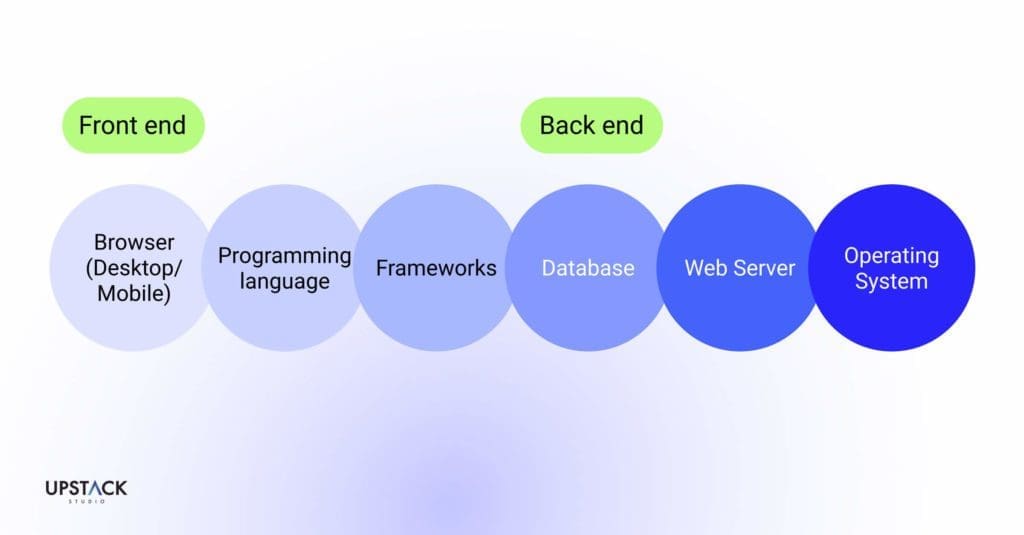
The hiccup is that there are multiple options for each component, and a developer will normally specialize in a few of each based on their niche.
For example, for mobile-responsive websites, Upstack Studio uses ReactJS for frontend and Ruby on Rails for backend development.
Another developer doing the same thing might use something called Laravel instead of Ruby on Rails.
Are either of us wrong?
Nope! A stack is just a tool.
Some tools are marginally better than others at a specific task, but all of them get most jobs done in the hands of a competent user.
Our Upstackers are competent at Ruby on Rails and their developers are good with Laravel.
Most of the time it’s that simple.
Occasionally, it’s not.
For some founders, it is possible that your project has needs that benefit from really specific stack choices. In these cases, an improper stack early on will lead to issues with scalability and continuity and may require a total rework down the line.
It’s admittedly something very hard to evaluate as a non tech founder, but you can’t run away from it.
We recommend noting a developer’s suggestions, then getting a second opinion from a knowledgeable third party.
What’s your communication process like?
The communication process depends on methodology.
Some have frequent communication throughout development, others focus more on the start.
It drastically affects your visibility of progress, so it’s really important to clarify this early on.
Upstack Studio involves founders throughout, in line with our Agile methodology with a Scrum approach.
Here’s what that looks like in practice.
Step 0: The project is divided into blocks of time called sprints each lasting two weeks.
Step 1: We meet with you before a sprint to discuss action items.
Step 2: We align on what needs to be done within the coming two weeks.
Step 3: We build the product, you build the business.
Step 4: We meet at the end of two weeks for a progress update and plan the next sprint.
Step 5: Repeat forever (remember there’s never 100% with us)
As you can see, founders are always kept informed of what’s happened and what will be done next.
Developers that encourage founders to have a hands-off approach when it comes to progress monitoring are a huge red flag.
What kind of tools or apps do you use for communication?
A sub-question under communication, and especially important for remote or offshore hires.
Tools should cover four functions:
- Overall project management,
- Virtual meetings,
- Instant messaging, and
- Visual aids
There are tons of great options out there.
At Upstack Studio, we personally use
- Clickup for project management
- Google Meet for meetings.
- Slack for instant messaging
- Miro for visual brainstorming, and
- Figma for designs, mockups, wireframes, etc,
Like we said, though tons of options. The only wrong answer is “no answer”.
How big will my app development team be?
Your project should have at least one:
- UI/UX designer,
- developer with back and frontend expertise, and
- project manager to keep everything on track
Generally, its better if the agency can assign more people for a role (except project manager).
More hands get work done faster and because we hold each other accountable, the quality is higher.
To you, it’s the same charge because it’s still the same total number of hours.
And there’s always the project manager to watch over everyone.

If your app needs a lot of complex research or features, you will need more senior staff. That’s gonna cost more money, but it’s something you just can’t avoid.
If it makes sense, the agency can assign a mix of senior and junior developers to mitigate costs.
Can you give a time and cost estimate?
Give your wallet a farewell hug.
Say you’re in the market for an average app.
Nothing too fancy, but not the kind of stuff you can build in a day.
Expect at least 30 – $35,000 per app if you’re talking to an app developer in Asia.

We say ‘per app’ because depending on what you need, you might have to spend on two apps: one for Android, one for iOS.
If your developer doesn’t raise these two cost-saving ideas, ask them these two sub-questions:
Can I get away with a cross-platform app?
Cross-platform apps are solutions that work across multiple systems, at the cost of not being able to realize the full features of each.
Unless you need those features, who cares? Your development costs are now halved.
Can I get away with a mobile site?
Even better. They are way more cost-effective and faster to build, and are ideal solutions for many needs.
So do this.
Find out the average app development cost in the region your developer is from.
When your developer gives you an estimate, ask them to break down the cost.
If it goes beyond the average range, ask them why.
Your app could be really complicated, almost always a sign of unnecessary features. A good developer should be asking you to cut down on these.
And if they quote you a price below the range, also ask why.
Is your app really simple?
Are the developers just eager to get you as a client?
If it’s the first one, fine, but the second one would concern us.
App development is not cheap with lots of moving parts and manhours involved. Competent developers attract customers based on competence, not price.
Remember, you get what you pay for.
And that’s it! Let’s just recap all the questions and compile them into a list.
Recap of Questions to Ask App Development Companies
- 1: What’s your development methodology and process?
- 2: Have you worked on similar projects?
- 3: What kind of tech stacks do you use?
- 4: What will our communication process be?
- 4.1: What kind of apps/tools do you use for communicating?
- 5: How many team members will you assign to my project?
- 6: How much do you think it will cost and how long will it take?
- 6.1: Can I get away with just a mobile site?
For your convenience, we’ve compiled these into a free cheat sheet with space for answers. You can make as many copies as you want.
App Developer Interview Questions Template
Download this template now so you know exactly what to ask App Development Agencies! Let us know where should we send it through the form below.
When you meet a developer for the first time, make a new copy, ask them these questions and write down what they say.
After a round of interviews, compare them side by side and you should know who’s the best choice and whether best is good enough.
And hey, we’ll put our money where our mouth is. Ask us these questions!
We’ll take care of your app, just leave her in our capable hands.
